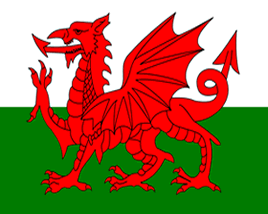
The Bardic name of Hedd Wynn (Shinning Peace) was that of Ellis Humphrey Evans born 13th January 1887 a farmer's son of Trawsfynydd, Merionnydd, North Wales.
His home land of Wales is a small proud country on the western coastline of Great Britain although governed from London for more 600 years in 1999 it was granted devolved powers and the first Welsh Government for over 600 years was empowered in it's capital city of Cardiff.
Wales is a Celtic nation of some two and half million people and although surrounded by seas on three sides it has one of the largest boundaries with England, it has maintained its own identity with its culture and language and the scenery of Merionnydd we little changed since Ellis’s days.
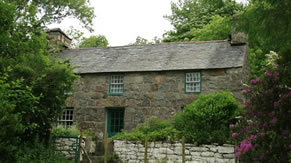
' Yr Ysgwrn '
Hedd Wyn's home has been purchased by Welsh Assembly Government for the Welsh Nation
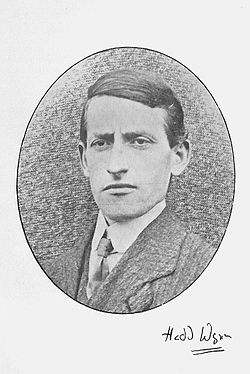
Click here for link to Wikipedia 'Hedd Wyn'
31,000 soldiers died in the Battle of Pikem Ridge - The British commander in Chief, Field Marshall Douglas Haig - made the bald entry in his diary for the 31st July : " A fine day's work " .
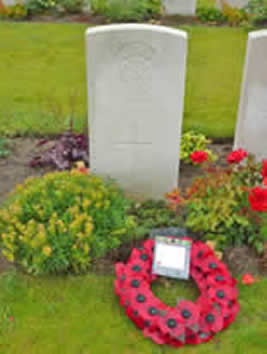
Hedd Wynn's headstone
Artillery Wood Cemetry Nr. Boezigne
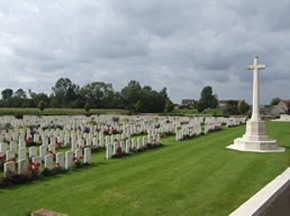
Artillery Wood Cemetry
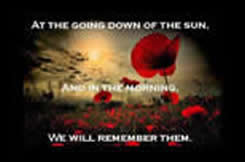
It was the 6th September 1917 and the British Prime Minister Welshman David Lloyd George is ready to
present the Eisteddfodd Chair to the winning Bard at
the National Eisteddford of Wales - Birkenhead- The Archdruid announced that the winning entry, it was
under pseudonym Fleur-de-lis was the winner.
Trumpets sounded and everyone looked for the winner, but - no one stood up - no one went forward, the
Archdruid then called for the winner to go the stage,
but no one again stood up, the audience all looked to
see had won ! but not one stood up, then came the announcement that the winner was Hedd Wynn - Humphrey Ellis Evans the Shepherd Boy from Trawsfynydd who had died a Solider in Flanders
Fields some six weeks earlier.
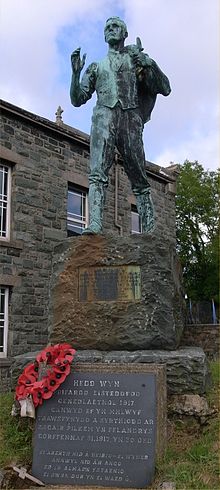
Trawsfynydd Memorial to Hedd Wynn
Although Ellis - Hedd Wyn died a soldier in Flanders Fields his hometown of Trawsfynydd in 1923 erected a statue in his memory of a Shepherd boy who never returned home. This bronze statue of him dressed as a Shepherd was unveiled by his mother in 1923 and bearing an inscription which Hedd Wynn had written in memory of friend who lost his life in the trenches.
Ei aberth nid a heibio - ei wyneb Annwyl
nid a'n ango Er I'r Aimaen ystenio Ei dwm
dur yn ei waed o
(Neither his sacrifice nor his dear countenance
are forgotten, though the Hun has stained his fist
of steel in his blood)
Rhyfel - War by Hedd Wynn
Gwae fi fy myw mewn oes mor ddreng,
Woe that I live in this dire age
A Duw ar drai ar orwel pell;
When God on far horizions glees,
O'i ôl mae dyn, yn deyrn a gwreng,
Yonder men high and lowly wage
Yn codi ei awdurdod hell.
Yonder men high and lowly wage
Pan deimlodd fyned ymaith Dduw
And seeing God had turned away
Cyfododd gledd i ladd ei frawd;
A sword they raised to stay their own
Mae sw^n yr ymladd ar ein clyw,
We hear the tumult of the frat
A'i gysgod ar fythynnod tlawd.
On humble homes its shadows frown
Mae'r hen delynau genid gynt
And there, the weeping willow trees
Yng nghrog ar gangau'r helyg draw,
Bear the old harps and sang amain
A gwaedd y bechgyn lond y gwynt,
The lads' wild anguish fills the breeze,
A'u gwaed yn gymyg efo'r glaw.
Their blood is mingled with the rain
The died in hell - they called it Passendale
In August 2014 close to where Hedd Wynn fell
a Welsh Memorial was unvelied by the
Rt.Hon Carwyn Jones
First Minister Welsh Government
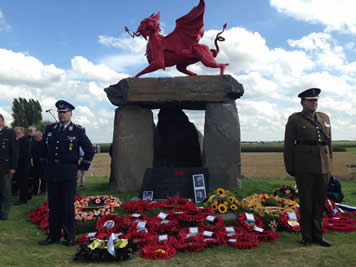
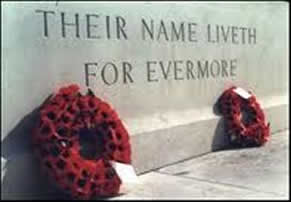
' They shall grow
not old, as we that are left grow old, Age shall not wary them, nor the years
condemn, at
the going down of the sun and in the morning
We will
remember them . '
Lawrence Robert Binyon 1869-1943 |
Hedd Wynn
Ellis Humphrey Evans
A tragedy in Flanders Fields
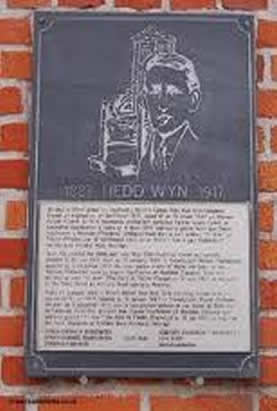
In 1914 the outbreak of World War 1 the Great War to end all Wars called the men of Wales to arms. Over 280,000 Welshmen fought in the war, almost 14% of the population responded and that was a lot more than any of the other home nations.
Casualties were so high in the War that the government could no longer rely on volunteers
and conscription was introduced early in 1916
often calling up men with no stomach or heart
for War.
Fellow Welshman David Lloyd George was a Minister in the British Government when war broke out and was lately to become Prime Minster of the United Kingdom in 1916 his family like Ellis's also hailed from North Wales.
In 1916 the Evans family received notice that they had to give one of their three sons to fight in the War. One son lived in New Zealand and at home on the farm with Evan and Mary Evans were two sons Ellis and Bob and their daughters. Bon was keen to join up but Ellis although a pacifist at heart felt it his duty as the eldest son and the duty of his over eager brother.
In February 1917 he reported to Litherland a camp near Liverpool. He was assigned to the 15th Battalion of the Royal Welch Fusiliers and on the 9th June 1916 he joined his unit in Flechin, France. They were soon to move from France into Belgium (Flanders). He wrote home 'Heavy weather, heavy soul, heavy heart. That is an uncomfortable trinity isn't it? ' I never saw a land more beautiful in spite of the curse that has landed upon it'.
His home town of Trawsfynydd is a small township and rural community of scattered farms. The main living in 1917 would have been from the land or the slate quarries in nearby Blaenau Ffestiniog. Time as not changed the rural community and very little as altered in the Town since the days Ellis roamed it, farming dominated the economy, most of the slate mines have gone and recently a Nuclear Power Station was decommissioned, but one thing that hasn't changed is that today, Welsh is still the first language of it's inhabitants with more than 91% of the population speaking Welsh.
Hedd Wyn was to enter his poetic works into Eisteddfodau from the age of 19 and was soon to win. He won hist chair in nearby Bala in 1907. In 1913 he again won taking the Chair at Pwllheli. In 1915 he travelled to Pontardawe in South Wales, he had in 1908 tried his hand as coalminer in the rapidly growing South Wales coalfield but disliked it and returned home to North Wales, but his journey in 1915 to the Eisteddfod was to more fruitful taking the chair home to his family farm 'Yr Ysgwrn'
He first entered the big one - The National Eisteddfod of Wales in 1915 which was that year held in North Wales - Bangor the following year 1916 saw him once again enter the National Eisteddfod this time in Aberystwyth (South Wales) and come second.
In 1917 he decided to once again compete for the Chair in the National Eisteddfod, he had by this time been conscripted into the army but devoted all his spare time to his writing, he finished his work in July, 1917 but at first there was difficulty in him gaining permission from his commanding offer to enter his work, his work was naturally in his native tongue of Welsh and the Eisteddfod to this day still conducts all its business in Welsh. His commanding offer was English and understood no Welsh and feared that the document was propaganda ! after much consideration and undoubtedly trust he allowed his to go to the National Eisteddfod and it left Flanders in the post on the 15th July, 1917.
The National Eisteddfod of Wales in 1917 back in the North but just over the border in England at Birkenhead, many Welsh lived in Birkenhead and the Liverpool area and there were even Chapels there that held their services in Welsh.
The Chairing ceremony of the National Bard was to be held on the 6th September 1917 and no other than the Prime Minister David Lloyd George was to be there. Ellis - Hedd Wyn had now in 1917 moved from France to the battlefields of Flanders (Belgium) was stationed Nr. Poperigne not far from the City of Ieper. On the 31st July 1917 at 03.50hrs. his unit was ordered to attack. The Third Battle of Ieper (Battle of Passchendaele) had started ! Heavy rain soon turned the battlefield into a swamp. The 15th Battalion took Pilkem and then advanced toward Iron Cross (Hagebos). They came under heavy fire from the Germans in Battery Copse. Hedd was shot in the back. There are a number of versions of what followed. The most likely is that he was taken by four comrades to a first-aid post at a dug-out called Corner House, there a Doctor ascertained that he had little chance of surviving, but he did not lose consciousness. " Do you think I will live ? " he asked the Doctor, despite his critical state, Hedd Wynn smiled, ' You seem very happy, a solider remarked, ' Yes I am very happy' he replied Those were his last words. Hedd Wynd died at about 11.00hrs.
It was the 6th September 1917 and the British Prime Minister Welshman David Lloyd George is ready to present the Eisteddfodd Chair to the winning Bard at the National Eisteddford of Wales - Birkenhead- The Archdruid announced that the winning entry, it was under pseudonym Fleur-de-lis was the winner. Trumpets sounded and everyone looked for the winner, but - no one stood up - no one went forward, the Archdruid then called for the winner to go the stage, but no one again stood up, the audience all looked to see had won ! but not one stood up, then came the announcement that the winner was Hedd Wynn - Humphrey Ellis Evans the Shepherd Boy from Trawsfynydd who had died a Solider in Flanders Fields some six weeks earlier.
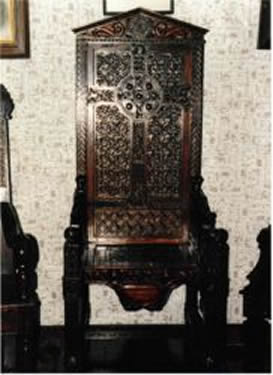
The Chair was empty, draped in black, the Eisteddfod in tears and the Poet in his grave, said the Archdruid Dyfed, Hedd Wynn now laid in Flanders Fields.
The Chair draped in Black was carried home on horse and cart some 90 miles (140km) to Yr Ysgwrn, Trawsfynydd to sit amongst his other chairs.
The Western Mail newspaper reported at the time ' instead of the usual chairing ceremony the chair was draped in a black pall amidst death-like silence, and the bards came forward in long procession to place their muse-tribute of englyn or couplet on the draped chair in memory of the dead hero bard hero '
Today the farm is occupied by his nephews Gerald and Ellis Williams and their Uncles chairs still line the walls with his big prize the chair from the National Eisteddfod of Wales still draped in back. The 1917 Eisteddfod chair was ironically carved by a Flemish carpenter who fled Flanders at the outbreak of war and settled in Birkenhead - his name Eugeen Vanfleteren.
Hedd Wyn is buried in Artillery Wood Cemetry, Boesinge were the inscription on his headstone is to E H Evans ' Hedd Wynn ' "Y Prifardd Hedd Wyn" " The Chief Bard Hedd Wynn "
He is immortally a war poet but in his home land will always be
a Bard who won the big chair at the National Eisteddfodd of Wales. He has become a link between the Flemish and the Welsh, two small Celtic nations working to keep their culture and native tongue, moving and praying for a peaceful Europe that no longer leaves its youth in Foreign Fields.
The day he died a fellow poet died he to his also buried at Artillery Wood, Irishman and fellow Celt Francis Edward Ledwidge born 19th August 1887 to Patrik and Anne Ledwidge, Slane, Boyne Valley, Ireland some 30 miles from Dublin (for further information visit www.francisledwidge.com)
Many ceremonies have been held since his death to his memory, in 1992 on the 75th Anniversary of his death a commemorative slate plaque was unveiled at the
Hagebos cross roads in Langemark to his memory and an exhibition in the Cloth Hall in Ieper. In 2007 the 90th Anniversary BBC Wales transmitted from his grave.
A humble sincere memorial to his memory can be found in
St. Georges Church, Ieper placed by Merched -y-Wawr, Trawsfynydd.
Welsh Choirs have sang at his grave side and filled the air with his native tongue, he is not alone in that graveyard many fellow countrymen are there with him and many more in the fields of Flanders.
We would like to say thank you to Lieven Dehandschutter who brought this story to us he produced a book Hedd Wyn and this can still today be bought in Ieper in Flemish, Welsh and English.
Hedd Wynn 1887 - 1917
Een Welshse tragedie in Vlaanderen
Trasiedi Cymreig yn Fflandrys
A Welsh Tradedy in Flanders
Lieven Dehandschutter
In 1992 the film Hedd Wynn scripted by Alan Llwyd and directed by Paul Turner brought his story to the World Stage
its premier was held at Theatr Arudwy, Harlech in the presence of his family, it won several awards and was nominated as best Forgone Film in the Oscar's in 1993.
He continues to represent a lost generation that could have further enriched our literature and national life had the been spared.
The acclaimed poet, Alan Llwyd maintains that his Eisteddfodd entry in 1917 Yr Arwr ' 'is possibly the most ambitions of any Eisteddfodd winner in the 20th century' Hedd Wynn's poems had been turbulent and emotional before 1914, often dwelling on the horror of war, among them one simply entitled Rhyfel (War)
In his 1987 book Llen Cyni a Rhyfel (The Literature of Adversity and War). Tecwyn Lloyd describes it as 'One of the great verses of our century and the greatest of all war poems of our era'.
In two lines it sums up the terror of battle in the trenches during the Great War. 'With the cries of the boys filling the air / and their blood mixed with the rain '.
|

